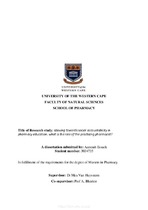| dc.contributor.advisor | Van Huyssteen, Mea | |
| dc.contributor.author | Essack, Azeezah | |
| dc.date.accessioned | 2020-06-26T11:18:29Z | |
| dc.date.available | 2021-08-30T22:10:05Z | |
| dc.date.issued | 2020 | |
| dc.identifier.uri | http://hdl.handle.net/11394/7268 | |
| dc.description | Magister Pharmaceuticae - MPharm | en_US |
| dc.description.abstract | The World Health Organisation (WHO) has stated that “there is no health without a workforce” (Campbell et al., 2013). The health workforce is essential for every health care system. The availability, accessibility and quality of health care workers play an important role in improving and overcoming health system challenges, in particular the call to universal health coverage (UHC) as stipulated in sustainable development goal 3. It has been observed that there is limited collaboration between healthcare systems and academic institutions. According to an article by Frenk et al., 2010, this limited collaboration has resulted in a mismatch between health care graduates’ competencies (such as inter-professional collaboration) and the needs of the population that they serve. One of the problems of health education institutions is the emphasis on curriculum content and learning methods as opposed to social purpose and moral obligations. | en_US |
| dc.language.iso | en | en_US |
| dc.publisher | University of the Western Cape | en_US |
| dc.subject | World Health Organization (WHO) | en_US |
| dc.subject | Higher education | en_US |
| dc.subject | Pharmacy | en_US |
| dc.subject | South Africa | en_US |
| dc.subject | Western Cape | en_US |
| dc.subject | University of the Western Cape | en_US |
| dc.subject | Health workers | en_US |
| dc.subject | Health professions education | en_US |
| dc.title | Moving towards social accountability in pharmacy education: what is the role of the practising pharmacist? | en_US |
| dc.rights.holder | University of the Western Cape | en_US |

